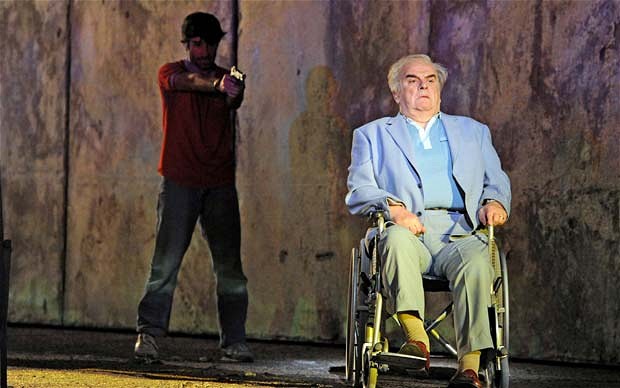Less than two months left in 2014, but the entertainment couldn’t be better.
Late to the party again, but I’ve been meaning to say a word or two about the season-ending episode of “Masters of Sex” which aired several weeks ago. That double twist was totally delicious. First, learning that Ethan Haas, Bill’s former rival, was the man behind Dr. Kaufman, Bill’s current competitor in the race to publish, only to be capped by the appearance of former Provost Barton as the man who caused the squelch at Bill’s request. Each plot turn was an unexpected pleasure.
These developments, plus Ginny’s losing custody of her kids (it’ll never last—her ex is a flake), should get “Masters of Sex” started on a dramatic Season Three when it returns. I can’t wait.
_______________________________________________________________________________________________________
 What a delightful end to October.
What a delightful end to October.
As a result of concentrated lobbying by her many fans, Joyce Di Donato, Kansas City’s own, was invited to sing the National Anthem prior to start of Game 7 of the World Series. She did it a cappella, tossing in a couple of blue notes and at least one simplified Handel progression. Her rendition was very much reflective of her personality—no muss, no fuss, but straightforward and straight from the heart. Brava. Too bad the Royals, this year’s Cinderella team, didn’t complete the dream by winning.
This is definitely Joyce’s New York year. She’s one of the artists featured in Carnegie Hall’s Perspectives Series, and thus far we’ve had her “Alcina” in concert version (I took a pass—after last season’s “Theodora,” I wasn’t ready for another four-hour baroque extravaganza sans stage action) and a lovely recital that was streamed live and which will remain on the Medici website until the beginning of February. The unifying subject is Venice; I found the second half of the program, featuring songs by Michael Hand and Reynaldo Hahn, to be more engaging than the first.
Joyce returns for two more Carnegie Hall performances in the Perspectives Series and of course (finally!), “La Donna del Lago” at the Met. Good times ahead.
______________________________________________________________________________________________________
Yes, I saw it.
I attended the second performance of “The Death of Klinghoffer” at the Met, and to say it was quite an experience doesn’t exactly do it justice.
Security was even tighter than in the weeks post-9/11. Police cars lined the curb in front of Lincoln Center; parade barricades restricted foot traffic onto the plaza. Although the number of protesters across the street seemed minimal, several stood at the barricades speaking to the police while holding their signs that labelled Peter Gelb a Nazi, among other pleasantries. Uniformed police and Lincoln Center security seemed to be everywhere. In the opera house patrons were required to check all briefcases, totes and back packs; pocketbooks were thoroughly searched and detector wands were in use. A number of men in suits wearing security badges patrolled the lobbies as well as the auditorium during the performance.
Despite all this, the atmosphere was more subdued than tense. Once the performance started and the first of John Adams’ extraordinary choruses began, the focus became the music. The opera played somewhat differently than I had anticipated. That Bach’s Passions served as a model for Adams was quite evident; I was also reminded of Berlioz’s “secular oratorio,” “The Damnation of Faust,” in which the artists spend more time singing at each other rather than to each other. “Klinghoffer” is very contemplative; most of what you hear takes place in the characters’ heads. Only when Leon Klinghoffer confronts one of the terrorists who responds in diatribe, and at the very end, when the Captain tells Marilyn Klinghoffer that her husband has been murdered, do characters truly interact. Actually the chorus is the true leading character in “The Death of Klinghoffer.” By turns portraying Palestinians, Israelis and passengers on the Achille Lauro, it has the most extraordinary music in the opera, and the Metropolitan Opera Chorus was perfection.
It speaks volumes about the state of the world that a mob of willfully ignorant morons, the majority of whom know nothing of the art form and in fact needed a map to find the opera house in front of which they protested, could halt an HD telecast intended for people who have loved opera for decades. I’m one of them, and my biggest regret over this entire controversy is that the national and indeed, the international, opera audience was deprived of the ability to experience this production of “The Death of Klinghoffer.” I can only hope that the Met management has learned that caving to bullies is not how an arts organization should be run.
___________________________________________________________________________________________________
I recently attended an incredible performance of Mahler’s Symphony No. 2 by the Phildaelphia Orchestra at Carnegie Hall. Yannick Nézut-Seguin was a man with a plan, shaping the work as few conductors do. I don’t always agree with his vision of a work, but I always respect his choices—the man is frequently amazing.
In this case I was glad we were promised a resurrection, because the first movement was fierce, unrelenting, and in fact quite scary to hear on Halloween night. There was total commitment from the orchestra throughout the performance; the brass, especially the trombone section, was extraordinary. Nézut-Seguin has the pulse of this work—I especially enjoyed his reading of the “Knaben Wunderhorn” movements. The soloists were Angela Meade, whose soprano really did fill the auditorium, and Sarah Connolly, who performed a lovely “Urlicht.” The bravos and curtain calls were well-earned indeed.
Next up: Shostakovich’s “Lady Macbeth of Mtstensk” at the Met. Looking forward to seeing that bad girl do her stuff.








